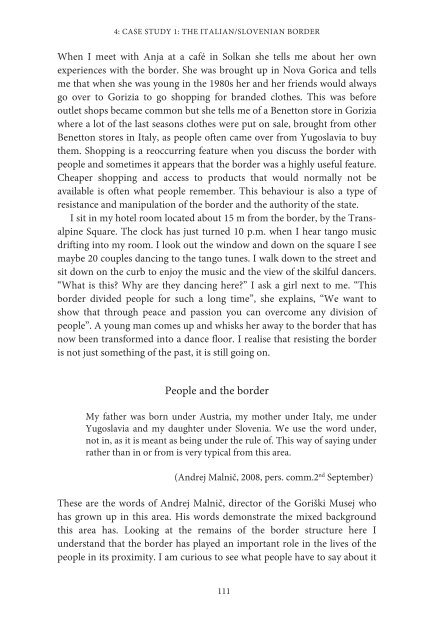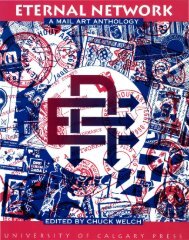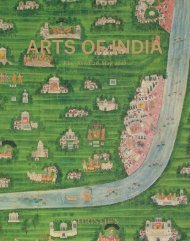1JZGauQ
1JZGauQ
1JZGauQ
You also want an ePaper? Increase the reach of your titles
YUMPU automatically turns print PDFs into web optimized ePapers that Google loves.
4: CASE STUDY 1: THE ITALIAN/SLOVENIAN BORDER<br />
When I meet with Anja at a café in Solkan she tells me about her own<br />
experiences with the border. She was brought up in Nova Gorica and tells<br />
me that when she was young in the 1980s her and her friends would always<br />
go over to Gorizia to go shopping for branded clothes. This was before<br />
outlet shops became common but she tells me of a Benetton store in Gorizia<br />
where a lot of the last seasons clothes were put on sale, brought from other<br />
Benetton stores in Italy, as people often came over from Yugoslavia to buy<br />
them. Shopping is a reoccurring feature when you discuss the border with<br />
people and sometimes it appears that the border was a highly useful feature.<br />
Cheaper shopping and access to products that would normally not be<br />
available is often what people remember. This behaviour is also a type of<br />
resistance and manipulation of the border and the authority of the state.<br />
I sit in my hotel room located about 15 m from the border, by the Transalpine<br />
Square. The clock has just turned 10 p.m. when I hear tango music<br />
drifting into my room. I look out the window and down on the square I see<br />
maybe 20 couples dancing to the tango tunes. I walk down to the street and<br />
sit down on the curb to enjoy the music and the view of the skilful dancers.<br />
“What is this Why are they dancing here” I ask a girl next to me. “This<br />
border divided people for such a long time”, she explains, “We want to<br />
show that through peace and passion you can overcome any division of<br />
people”. A young man comes up and whisks her away to the border that has<br />
now been transformed into a dance floor. I realise that resisting the border<br />
is not just something of the past, it is still going on.<br />
People and the border<br />
My father was born under Austria, my mother under Italy, me under<br />
Yugoslavia and my daughter under Slovenia. We use the word under,<br />
not in, as it is meant as being under the rule of. This way of saying under<br />
rather than in or from is very typical from this area.<br />
(Andrej Malnič, 2008, pers. comm.2 nd September)<br />
These are the words of Andrej Malnič, director of the Goriški Musej who<br />
has grown up in this area. His words demonstrate the mixed background<br />
this area has. Looking at the remains of the border structure here I<br />
understand that the border has played an important role in the lives of the<br />
people in its proximity. I am curious to see what people have to say about it<br />
111




